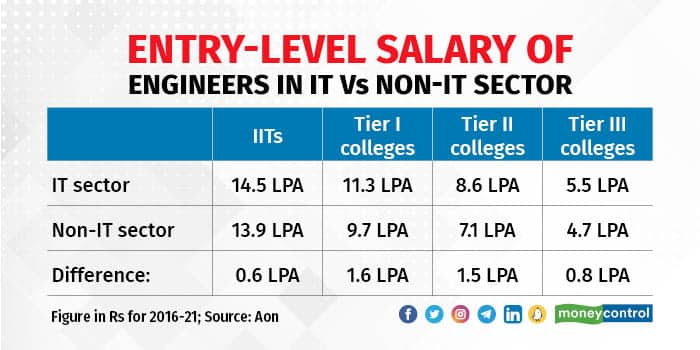In terms of delivering better salary, packages or CTCs to engineers, the IT industry is on top. Non-tech organisations used to have to pay a premium to acquire IIT personnel, but that is changing.
When Vipin Desai (name has been changed) was starting out as a software engineer, he searched for an industry that would provide him with a career with a high trajectory. That industry, he felt, was information technology services.
Six years later, when his younger brother Suyesh Desai was poised to follow in his footsteps, Vipin realised that, after correcting for inflation, his younger brother would be at the same CTC he was at in 2016. Meanwhile, a distant relative with the same degree had a higher CTC – but she opted to work in the automotive industry.
And that made Suyash think for a bit..
For the past decade, fresher wages in the IT business have been stagnant. While the median annual compensation of CEOs in India’s major IT firms increased by 835 percent between FY12 and FY22, the median remuneration package of freshers increased by just 45 percent.
For decades, the Indian IT sector has been a key employment provider, and it leads in terms of delivering greater pay to engineers. In FY2022, it grew by 15.5 percent, the quickest in more than a decade, to reach $227 billion.
Non-tech organisations have always had to pay a premium to acquire IIT expertise, but this is changing due to a drop in demand for tech personnel, according to professional services firm Aon.
The average wage for entry-level positions for IIT engineers in IT organisations between 2016 and 2021 was 14.5 LPA, followed by colleges in Tier I cities (11.3 LPA), Tier II cities (8.6 LPA), and Tier III cities (8.6 LPA) (5.5 LPA). CTC values comprise a fixed income, variable compensation, and a joining bonus.
“Non-IT enterprises are increasingly attempting to grow digital capabilities and returning to campuses in search of tech talent,” says Jang Bahadur Singh, head of Human Capital Solutions at Aon in India.

The average wage for entry-level positions for IIT engineers in IT organisations between 2016 and 2021 was 14.5 LPA, followed by colleges in Tier I cities (11.3 LPA), Tier II cities (8.6 LPA), and Tier III cities (8.6 LPA) (5.5 LPA). Cost To Company (CTC) values comprise a fixed income, variable compensation, and a joining bonus.
“Non-IT enterprises are increasingly attempting to grow digital capabilities and returning to campuses in search of tech talent,” says Jang Bahadur Singh, head of Human Capital Solutions at Aon in India.
Percentage Increment in Salary (2017-2022)
- Top Tier MBA Institute : 65%
- Large Product Company / Gulf Cooperation Council : 44%
- VC Backed Start-Up : 53%
- IT Service Company: 31%
Salary is Higher in Start-Ups
Startups, flush with cash, have been matching or exceeding the giants in terms of compensation for freshers and others. According to Uday Virmani, Assistant Dean at Mumbai-based BITSoM, it comes down to volume vs value – huge IT/ITES organisations recruit in bulk due to high turnover, and their pay have remained unchanged over the years due to homogeneity in the talent pool.
“However, despite not having a strong brand presence like some of the big IT / ITES organisations, new-age enterprises in the start-up ecosystem that are working on the newest technology have attracted top people with greater compensation, especially in the last couple of years,” he says.
This is mostly due to companies’ need for the greatest individuals to work on cutting-edge technology. However, there is another side to it. Working at a startup is far more demanding, with a poor work-life balance that may occasionally lead to burnout and the constant threat of a financing crisis and layoffs.
Furthermore, techies who elect to obtain an MBA after graduation are better situated. According to statistics from employment agency Zyoin, entry-level salaries offered at top MBA Institutes during campus recruitment have increased by an average of 65 percent.
“Given the current situation of the labour market, high-paying salaries will most likely continue to be the standard for workers in some high-paying areas, but entry-level workers will not notice much of a change,” says expert, Anuj Agrawal, Founder & CEO, Zyoin.













